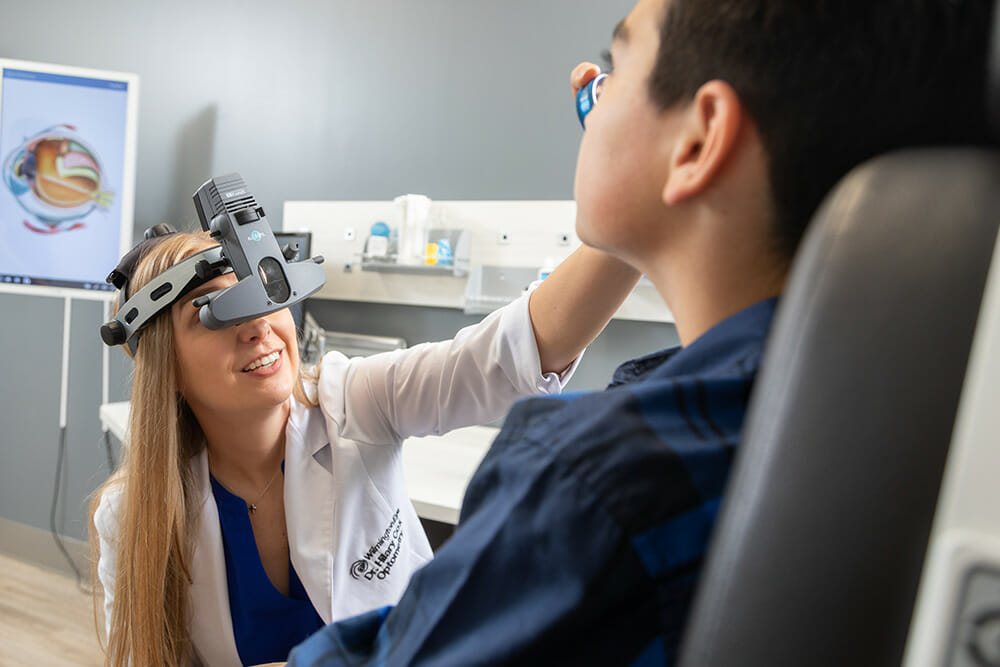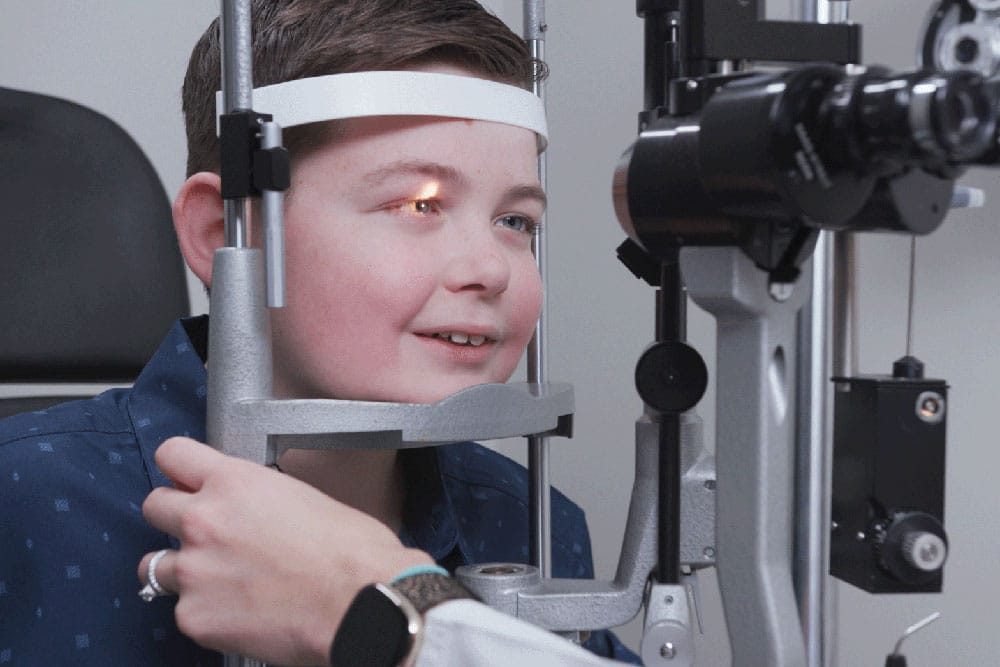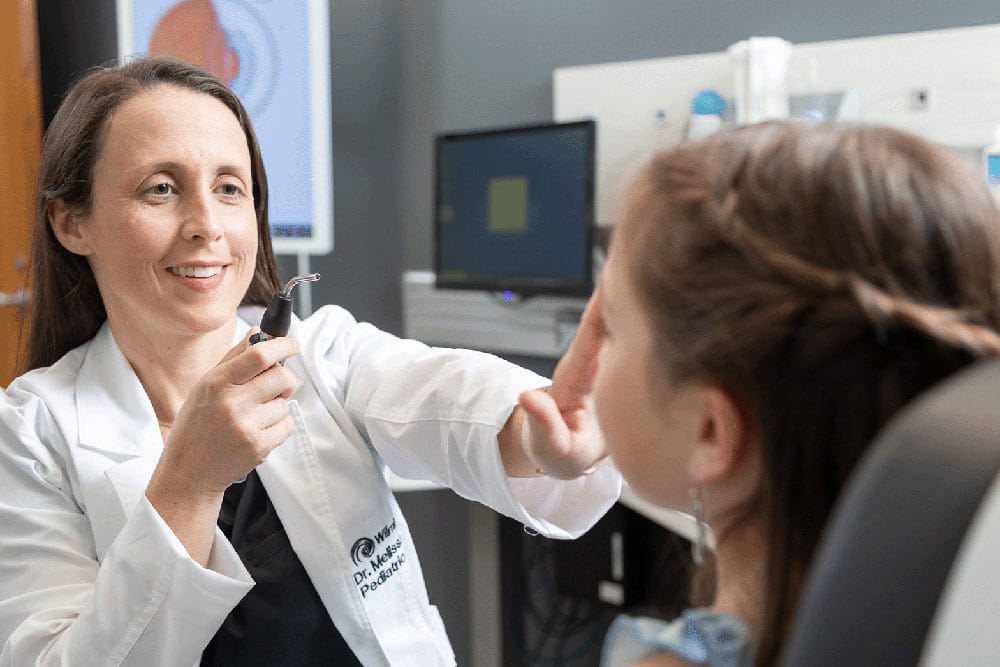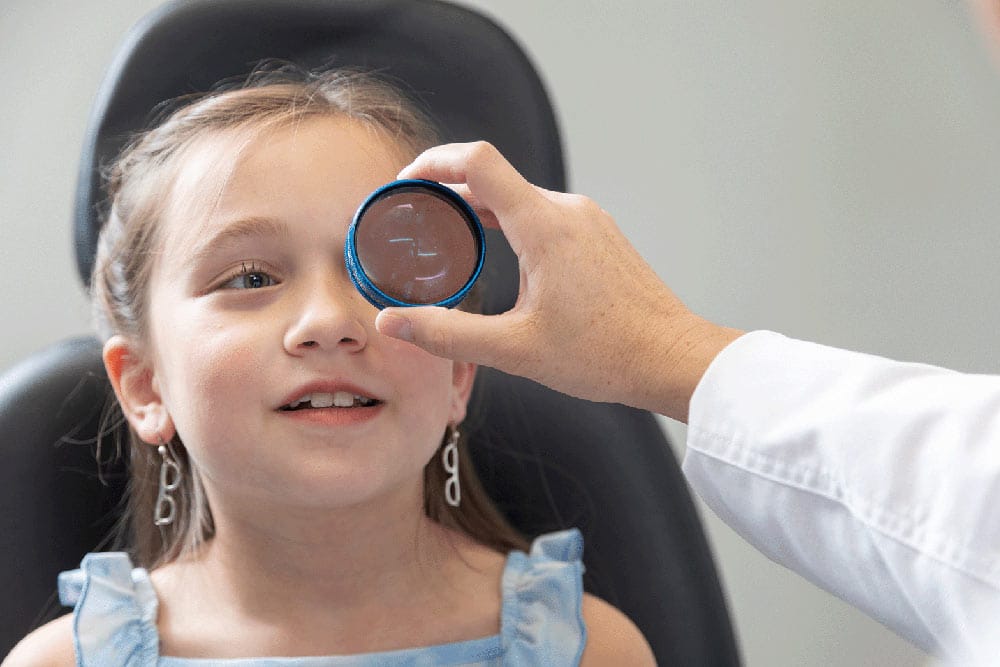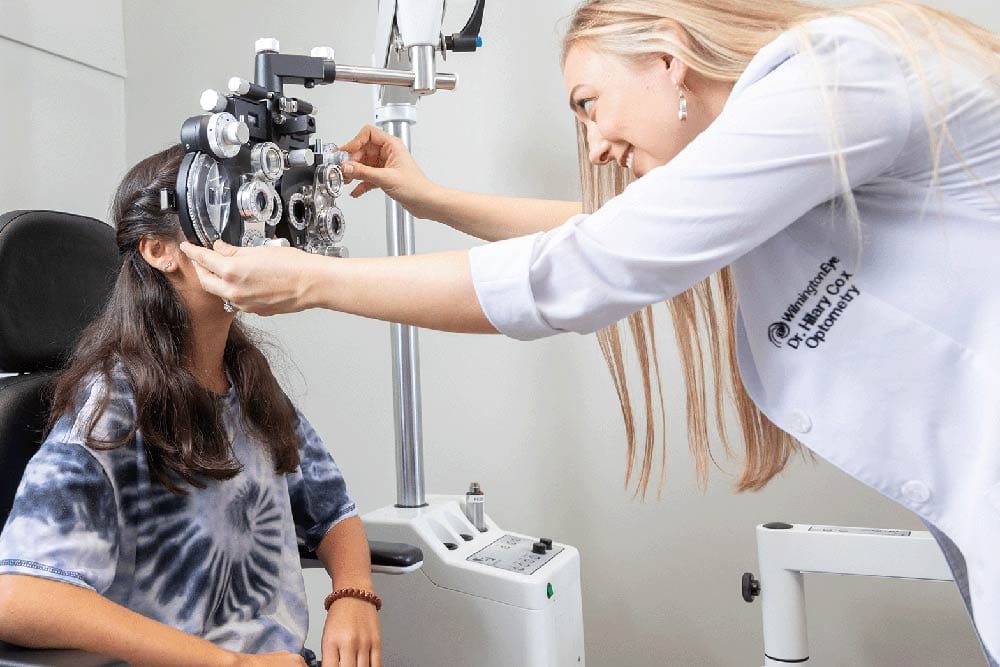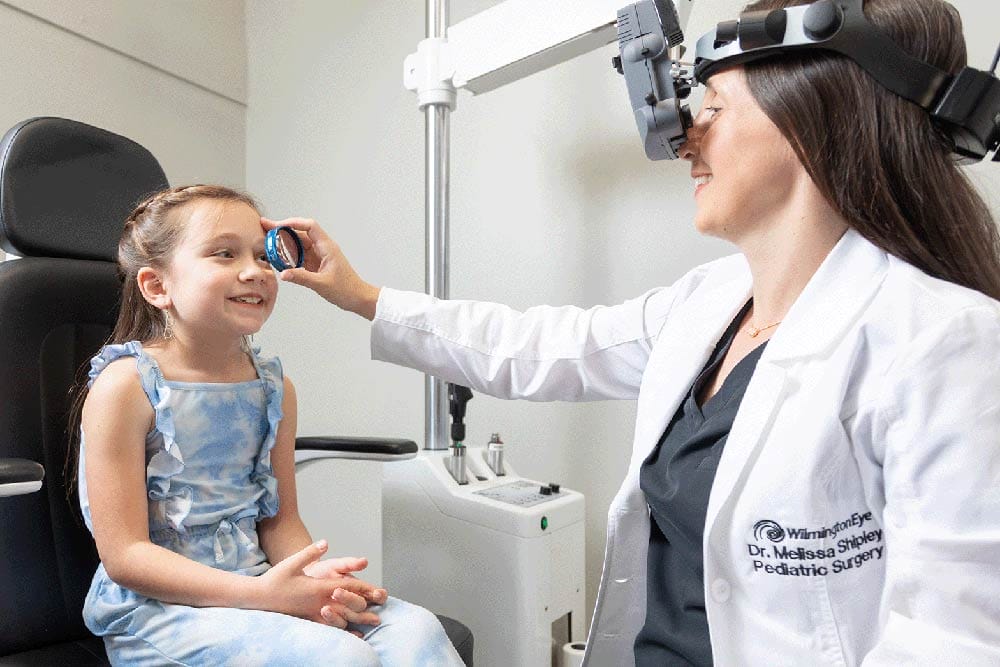Pediatric Vision Care for Your Child
Why is Vision Care for My Child So Important?
Vision is one of the most important ways that children take in the world around them, whether in the classroom or at play. In fact, nearly 80% of all learning is done through the visual system. When a child has healthy vision, they can focus unfettered on their interests and hobbies, excel in school, and reach their highest ambitions. If a child has undiagnosed vision problems, they can fall behind in school and withdraw from healthy activities such as reaching and playing outdoors. At Wilmington Eye, our experienced pediatric eye doctors offers specialized vision care for children of all ages to ensure healthy vision and success in everything your child does.
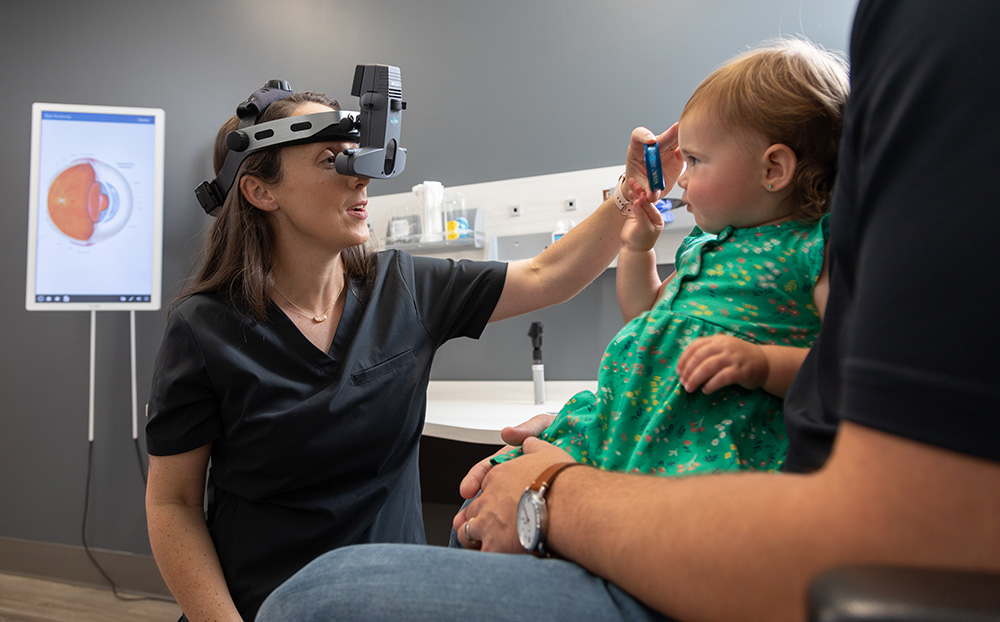
More Than Just Seeing Clearly
A comprehensive eye exam can ensure your child sees clearly. But healthy vision is so much more than just seeing clearly. Our pediatric team will evaluate how your child’s eyes work together as a team, how they focus, test coordination, and identify the presence of ocular diseases such as strabismus or amblyopia, which are common eye diseases among children. We also understand that children can be apprehensive about seeing an eye doctor. Our pediatric team of doctors and technicians work with both you and your child to ensure the process is fun, educational, and medically beneficial.
Visual Acuity
Visual acuity has to do with how well your eyes see at up close distances, intermediate distances, and far away distances. During a preventative eye care visit with our pediatric ophthalmologist or a pediatric optometrist, we can determine if your child has trouble seeing at any distance. If a refractive error is diagnosed, such as nearsightedness (also referred to as myopia) or farsightedness (also referred to as hyperopia), we will work with our licensed opticians to find the right glasses for your child.
Eye Teaming
Eye teaming is the ability to coordinate and use both eyes together as a team. It’s important for both of our eyes to be performing at the same rate, sharing the workload. When one eye is stronger than the other, children run the risk of losing function in one of their eyes as the brain slowly shuts down the weaker eye. Unfortunately, regular vision screenings by a pediatrician do not test for eye teaming. During a comprehensive eye care visit with our doctors, we’ll identify how well your child’s eyes perform as a team and ensure both eyes are equally strong.
Eye Tracking
Being able to follow along when reading or following an object that’s in motion—like a thrown baseball—is another important part of healthy vision. Oftentimes, children may have issues with tracking out of one eye, which may be a sign of strabismus. As the muscles that help move your child’s eye falter, it can lead to permanent damage and even vision loss.
Ocular Diseases
There are many ocular diseases that are common among children. These include strabismus, a misalignment of the eyes, or amblyopia, more commonly referred to as lazy eye. Our pediatric team will evaluate your child for any ocular diseases that might be present and develop a treatment plan suitable for the patient.
Why Are Pediatric Eye Exams Necessary?
How do you know that your child’s vision is healthy and that their eyes are functioning properly? Children are unlikely to raise concerns about their vision because they simply don’t know that there is a problem. They often assume that what they are experiencing or seeing is normal. And while most children will have vision screenings performed by their pediatrician’s office, they oftentimes fail to diagnose vision problems that can lead to learning issues. In fact, roughly 2 out of every 10 children who pass a visual screener at the pediatrician have a visual problem. That is why Wilmington Eye strongly recommends comprehensive pediatric eye exams for children prior to beginning their first year of school.
Our pediatric team understands the vital role vision plays in the development of your child. We believe that every child should start their educational journey unhindered by vision problems. If you notice an issue with your child’s vision or want to have peace of mind that your child can see the world clearly, schedule a pediatric eye exam today.
Preparing For Your Child’s Eye Exam
Helping your child see clearly and experience the world through crystal clear vision is what we do. Our team of doctors and medical professionals are here to offer exceptional vision care that you and your child can look forward to. To make your child’s eye exam convenient and stress-free, please take some time to understand what to expect during your child’s next eye exam. We ask parents to plan to be at your child’s eye appointment for 2 hours.
- Check-In: Arrive 15 minutes early to your child’s appointment to check in and complete any necessary paperwork. Have your current insurance cards, a list of your child’s medications and their current glasses or contact lenses.
- Review Your Child’s Medical History: A pediatric ophthalmic technician will take you and your child back to an exam room to review your child’s medical history. For some people, this step in the exam process may take place a few days prior to your child’s exam date via telephone with one of our team members.
- Vision Check: Your pediatric ophthalmic technician will do a thorough vision check. For children who are too young to identify letters, we use object recognition posters, which include a series of simple, idealized pictures.
- Intraocular Pressure Check: Your pediatric ophthalmic technician will check your child’s intraocular pressure. This is important to determine if your child is at risk of developing glaucoma.
- Dilation: Your child will be given dilation drops (usually performed annually). Our technicians are experienced in working to make the process simple and painless for your child. Once the dilation drops have been administered, you and your child will be taken to a dimly lit waiting room as dilation causes sensitivity to bright lights. Dilation takes approximately 30 minutes.
- Special Testing: Any special testing requested by your pediatric eye doctor will be done at this time.
- One-on-One With Your Child’s Eye Doctor: Your pediatric ophthalmologist will conduct a visual exam, review any test results with you, answer questions regarding your child’s vision and discuss any concerns or changes to your child’s vision. If a treatment plan is deemed necessary, your pediatric ophthalmologist will discuss this with you at this time.
- Check-Out: Once your child’s appointment has concluded, you will need to check out. During this time, you will be able to schedule your child’s next exam and purchase over-the-counter products such as patches or eye drops.
- Optical Shop: If a new prescription has been created for your child, we will send it to our full-service optical shop. You can view our selection of kid-friendly frames and get your child’s prescription filled before leaving your appointment.
- Review Request: After leaving our facility, you will receive a review request from Wilmington Eye. Your feedback provides essential information that allows us to continue to improve the patient experience for all children.
